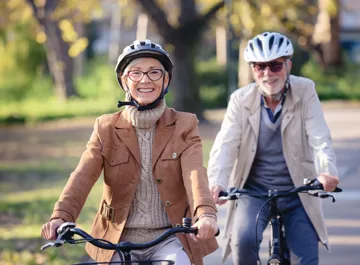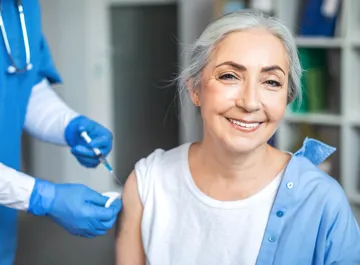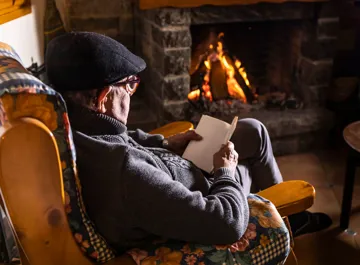
Managing minor winter ailments
At the first sign of a winter illness, even if it’s just a cough or cold, get advice from your pharmacist, before it gets more serious.
The NHS has produced We're here to help you stay well this winter, with some important information to help you or a loved one stay well this winter.
We hope that people with concerns about winter ailments, carers and families, find this guide useful. Download a copy of We're here to help you stay well this winter, or print out this page to give to someone you know.
This leaflet is available in alternative formats at nhs.uk/staywell
Email england.campaigns@nhs.net for braille copies.
Stay well this winter
If you’re worried about your health, don’t delay, your NHS wants to see you – help us help you get the care you need this winter.
Winter conditions can be bad for our health, especially for people aged 65 or older, and people with long-term conditions such as heart or kidney disease, COPD (including emphysema and chronic bronchitis), asthma or diabetes.
Being cold can raise the risk of increased blood pressure, heart attacks and strokes.
The cold and damp weather, ice, snow and high winds can all aggravate any existing health problems, increase the risk of a fall, and make us more vulnerable to respiratory winter illnesses. But there are lots of things you can do to stay well this winter.
Stay strong with winter vaccines
Many people get seriously ill from flu, including having complications like bronchitis or pneumonia, and every winter thousands of people die. COVID-19 can also still make people seriously ill. The risk from these viruses is greater during winter when they circulate most as people spend more time indoors.
Those aged 65 and over; those who are pregnant; or people who have health conditions that put them at risk; as well as unpaid carers and household contacts of those at risk, will be able to get protected ahead of winter by getting their flu and COVID-19 vaccinations.
It’s important to come forward if you are eligible, even if you have had previous flu and COVID-19 vaccinations or have had one of the viruses, as protection will fade and both viruses can change over time.
You may be invited to get your free winter vaccines by the NHS through the NHS App, text, email or letter. Don’t worry if you do not receive this – you do not have to wait for it before booking an appointment. If you are eligible, once these winter vaccines are available to you, go ahead and book.
If eligible, you can book a flu vaccine through your GP practice, local pharmacy, the NHS App or at nhs.uk/book-a-flu-vaccination. Seasonal COVID-19 vaccine appointments are available through the NHS App or at nhs.uk/covid-vaccination, which also allow those eligible to book both vaccines in one appointment.
If you can’t get online, you can call 119. 119 is also available by text relay on 18001 119 and the NHS 119 BSL interpreter service at signvideo.co.uk/nhs119. Many areas will also offer local vaccination walk-in options which do not require a booking.
If you are pregnant you are eligible for your winter vaccinations at any stage in your pregnancy. For flu, you can ask your GP practice, pharmacist or maternity team.
It is important that children get protected against flu to protect them from getting seriously ill and spreading the virus onto those that are vulnerable. The nasal spray flu vaccine is offered free through schools and community venues for school-aged children, so parents should keep an eye out for the consent form that will get sent to them. All children aged two or three can get the vaccine through their GP practice.
Also, don’t forget that if you’re aged 65 or over, or have certain health conditions, you are eligible for the pneumococcal vaccine, which will help protect you from pneumococcal diseases such as pneumonia. Ask your GP practice.
Getting your flu and COVID-19 vaccines are two of the most important things you can do to keep yourself and others around you safe this winter.
How to avoid passing on flu and COVID-19 to others
Advice from the UK Health Security Agency (UKHSA) is to:
- Stay at home if you’re unwell and work from home if you can – this helps reduce the number of people you have contact with.
- Avoid contact with people while you have symptoms, especially if they have certain long-term health conditions, which means that they’re at higher risk of illness such as pneumonia, flu and COVID-19.
- Let people who need to come into your home know that you have symptoms.
Treatments for COVID-19
The NHS offers treatments to people with COVID-19 who are at the highest risk of becoming seriously ill.
For more information, visit nhs.uk/CovidTreatments
If you are eligible for COVID-19 treatments, you should keep rapid lateral flow tests at home to use when you develop symptoms. If you have any symptoms of COVID-19, take a test as soon as possible, even if your symptoms are mild.
If your test is positive, call your GP practice, hospital specialist or NHS 111 as soon as possible. They’ll decide if you need referring for an assessment for COVID-19 treatment.
If your test result is negative, but you still have symptoms of COVID-19, you need to do a total of three rapid lateral flow tests over three days.
Keeping yourself and your home warm
Keeping warm over the winter months can help to prevent colds, flu and more serious health problems such as heart attacks, strokes, pneumonia and depression.
Age UK and UKHSA suggest heating your home to a temperature that is comfortable for you. This should be at least 18°C in the rooms that you regularly use such as your living room and bedroom. Low indoor temperatures can have a serious impact on your health, especially if you have medical conditions or are older.
With the rising cost of living, simple changes can help to keep you and your home warm now.
- Try to reduce draughts – you can fit draught excluders around doors cheaply.
- Keep your bedroom windows closed at night.
- Wear several layers of thinner clothing – this will keep you warmer than one thicker layer.
- Ensure you are eating enough and having hot drinks.
And remember to check that your heating and cooking appliances are safe. Contact a Gas Safe registered engineer to make sure they’re operating properly. Visit gassaferegister.co.uk and nationalfirechiefs.org.uk for more information.
Check for safety concerns around your home
For those that are elderly or frail, Age UK advises people to make some simple changes around your home to make it a safer place. For example, moving rugs and mats at the top or the bottom of the stairs out of the way, installing a night light near the bed to make sure you can see where you’re going if you wake up in the night, and removing trip hazards like trailing wires or clutter from your home.
It’s also important to think about fire safety. Most fires in the home start accidentally. Understanding why fires start and what you can do to prevent them will help keep you, other people and your property safe. Having working smoke alarms on every floor of your home can provide the vital early warning should a fire start.
You can complete an online home fire safety check yourself. After answering a few questions about you and your home, it will provide fire safety advice specific to you and tips on how to keep you and your household safe from fire.
For your free online home fire safety check, visit ohfsc.co.uk
Seeking financial support
Make sure you’re receiving all the help you’re entitled to this winter. There are grants, benefits and sources of advice available to help you make your home more energy efficient, improve your heating or help manage energy bills. There are also support measures in place to help with the cost of living, especially for those on low incomes. For example, if you claim certain benefits or tax credits, you may be eligible for an extra payment from the government to help with the cost of living. The government has published energy saving tips to help save money on bills at helpforhouseholds.campaign.gov.uk
For further advice on these support measures, visit Age UK’s website or call 0800 169 6565.
Keep active
There’s strong evidence that people who are inactive have an increased risk of heart disease, stroke, type 2 diabetes, some cancers, depression and dementia. Regular exercise can help improve your physical and mental health, reduce the risk of falling and can be beneficial for recovery if you do get ill.
UKHSA advises to reduce the amount of time you spend sitting down during the day. There are many activities you could do at home to keep active.
For tips on keeping active go to nhs.uk/keepactive or have a look at ageuk.org.uk
Mental health support
We all feel down from time to time, no matter our age. But if you are struggling with your mental health, NHS Talking Therapies could help you feel better.
Speak to your GP practice about NHS Talking Therapies if you are anxious, depressed or struggling to cope. Your GP team is there to help you – physically and mentally – and can refer you to the right service. You can also self refer by visiting nhs.uk/talk
If you live with serious mental illness, you are entitled to a free NHS annual health check – talk to your GP, key worker or mental health service to book it.
If you or a loved one are experiencing a mental health crisis, you can call your local NHS mental health helpline for 24-hour advice and support: information and contact details available on nhs.uk/urgentmentalhealth
Check your medicine cabinet
Ask your pharmacist what medicines should be in your cabinet to help you and your family this winter.
Many over-the-counter medicines (including paracetamol and ibuprofen) are available to relieve symptoms of common winter illnesses such as colds, sinusitis or painful middle ear infection (earache). Your pharmacist can help if you need any advice.
To manage winter illness symptoms at home, you should keep warm, rest, drink plenty of fluids, have at least one hot meal a day to keep your energy levels up and use over-the-counter medicines to help give relief.
For more information search ‘medicines’ on nhs.uk
Hand washing
Cases of infectious illnesses can increase over winter, including highly contagious infections such as flu and norovirus, also called the ‘winter vomiting bug’. These can make all of us unwell and can be especially serious for those of us who are more vulnerable, like the elderly and those people with certain health conditions.
Washing your hands with soap and water is one of the easiest ways to protect yourself and others from catching these viruses and help reduce the pressures on healthcare services.
Washing your hands properly removes dirt, viruses and bacteria to stop them spreading to other people and objects and can help stop the spread of common winter infections. Hand washing is particularly important when you’re visiting someone in hospital or another healthcare setting.
If you do not have immediate access to soap and water, then use alcohol-based hand sanitiser.
For more information go to nhs.uk/handwashing
Prescriptions
Make sure you get your prescription medicines before your pharmacy or GP practice closes for holidays.
And, if you’ve been prescribed antibiotics or any other medication, make sure you take them as directed.
You can order prescriptions via GP or pharmacy websites, by calling them, or via NHS-approved apps. Ask a friend, relative or volunteer to collect medicines for you.
A list of NHS-approved apps is available at nhs.uk/approvedproviders
You can also order your repeat prescriptions via the NHS App, as well as make GP appointments. The NHS App is available on the App Store and on Google Play.
For more information visit nhs.uk/nhsapp
Look out for other people
Remember that other people, such as older neighbours, friends and family members, may need a bit of extra help over the winter. For further advice on how you can help, visit Age UK’s website or call 0800 169 6565.
Icy pavements and roads can be very slippery, and cold weather can stop people from getting out and about.
Keep in touch with your friends, neighbours and family and ask if they need any practical help, or if they’re feeling under the weather.
Make sure they’re stocked up with enough food supplies for a few days, in case they can’t go out. If they do need to go out in the cold, encourage them to wear shoes with a good grip and a scarf around the mouth to protect them from the cold air, and to reduce their risk of chest infections.
And make sure they get any prescription medicines before the Christmas holidays start and if bad weather is forecast.
If they need help over the holiday period when the GP practice or pharmacy is closed or they’re not sure what to do, NHS 111 can help. The service is available online at 111.nhs.uk and also by phone. By answering questions about their health problem they will be told what to do and where to go.
Other advice and guides to support you during winter months

COVID-19 vaccination programme
Take me there
Flu vaccination
Take me there
Stay safe, well & warm
Take me there
Prepare for wintry conditions
Take me therePlease exercise your common sense when considering this guide and whether to take any of the steps that may be suggested in it. Whilst we have taken reasonable care to ensure that any factual information is accurate and complete, most of the information in this guide is based on our views and opinions (and sometimes the views and opinions of the people or organisations we work with). As a result, we cannot make any promises about the accuracy or the completeness of the information and we don’t accept any responsibility for the results of your reliance on it.
